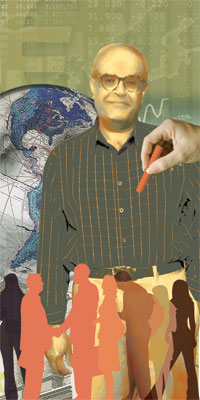Syllabus
Compounding interest
Economics professor stresses both research and teaching
Flip through the course syllabus of International Economics and you will immediately notice something about Professor Hamid Beladi. His teaching philosophy is an important component of the course. From day one, students are invited to work in partnership with one of the nation’s leading researchers in the fields of international economics and globalization.
Flip through the course syllabus of International Economics and you will immediately notice something about Professor Hamid Beladi. His teaching philosophy is an important component of the course. From day one, students are invited to work in partnership with one of the nation’s leading researchers in the fields of international economics and globalization.
“I approach my courses as collaborative activities between the student and myself. We are all in the classroom to learn. I just have a bit of a head start on the material,” Beladi says.
The class, offered to undergraduates in the fall and spring, is designed for students who have taken two other economics courses and want to understand the micro-foundations of international trade and finance. The course attracts students not just from the business school, but also from other areas of study who want the tools to understand and analyze economics from an international perspective.
For some undergraduates, the rarity of having a professor who believes research and teaching are complementary and equally important is an enormous opportunity.
“It is not often that you find a professor who is an accomplished researcher as well as an exceptional teacher,” says Jennifer Bigler, a senior majoring in geography and minoring in global analysis. “Professionally, the knowledge I’m gaining from Dr. Beladi gives me a better understanding of the forces which affect the international state system. Hopefully this better understanding will help me be more realistic in what I offer the world after graduation.”
Beladi has established a worldwide reputation as a leader in the field of international economics. He is the editor of the International Review of Economics and Finance and Frontiers of Economics and Globalization. He serves as associate editor of the Review of International Economics, working and editing alongside other world-renowned economists such as Carl Chen and Paul Krugman, winner of the 2008 Nobel Prize in Economics. He has published more than 150 papers in refereed academic journals with topics focusing on international economics and globalization.
For the 2005–2008 period, he was the highest ranked researcher in the College of Business, and in 2009, in the area of research excellence, was named the Col. Jean Piccione and Lt. Col. Philip Piccione Endowed Research Award recipient.
An advocate of multidisciplinary research, he is involved in scholarly research on international trade theory and policy, analysis of international joint ventures, global financial issues and environmental policies.
“I trust that my research has brought professional recognition not only to the economics department, but also to UTSA,” Beladi says.
That research has a direct advantage for the students and UTSA as a whole as it aims toward national research university status. “The interaction between quality faculty and students ultimately results in graduates who obtain better jobs and positions in society,” Beladi says.
But in the classroom, his top priority is giving students the basics.
So how does collaboration between student and professor work? As Beladi will tell you, teaching is a creative art that requires constant adjustments and modifications.
Here he is mid-semester, holding court in his own theater:
Speaking in a loud, clear voice, Beladi begins a sentence about low-wage labor and trails off, creating space for the students to finish with the key phrase or concept he wants them to remember. It’s simple and creative, the two basic principles of his teaching philosophy.
Each class begins with a review of material already covered and then moves seamlessly ahead with new concepts. “The material is all common sense,” Beladi says. Forget math or equations. And he has a disdain for multiple choice tests, favoring instead short papers, take-home exams and problem sets that permit students to explore subjects at their own pace.
Over the course of the term, Beladi walks undergraduates through the basics of tariffs, protectionism, trade policy, exports/imports, trade blocs, and supply and demand while giving them a thorough sense of real-world economics. “I really want them to learn something,” he says.
To keep students from sinking into their seats, he builds on each concept like a storyteller, adding supportive yet directive phrases such as, “Are you with me?” or “I really just want you to listen. Just follow the story!” Afterward, to fix the information more fully in the students’ minds, he says, “Chew it up and digest it” or “Now I need your help. Let me test you for a second.” Lest anyone become confused or overwhelmed, he will caution students: “This is very simple. It’s not rocket science.”
To keep students on their toes, Beladi involves them in the smallest decisions. Mid-lecture, for example, he stops a discussion on international trade to ask a student in the front row which color of chalk will best highlight the point he is making on the chalkboard. “White chalk, or orange?” he asks.
“Orange” replies the student. However small a gesture, similar tactics keep the students alert. Attendance is high. Students arrive early, clamoring to know Beladi’s opinion of the federal government’s recently approved economic stimulus package. They come regularly to office hours.
Students such as Phillip Carroll are drawn to the class because Beladi translates economic concepts into real-world situations, citing his own research. “A lot of the professors forget that students don’t know anything about
economics,” says Carroll. “Professor Beladi explains things in a lot of different ways.”
To get away from the idea that teaching is a solo performance by the instructor, Beladi’s students are expected to participate regularly, even to redirect the conversation.
“The vast majority of students—especially undergraduates—in my courses will never become producers of scholarship in international trade theory and policy,” he says. “So my responsibility is to cultivate in students a keen reflective thinking and critical analytical capacity in order that they can be responsible, well-informed decision makers.”
Research (production) and teaching (distribution) are so intertwined for Beladi, there’s no separation between the complex research he does with other academics and the simplified explanations he offers to students in jeans and T-shirts. And he has published on this topic as well, encouraging universities to find value in both research and teaching as a way of investing for the future.
“Research without teaching becomes unintelligible and uncommunicative,” Beladi explains. And teaching without research causes academics to become disengaged from an ever-changing body of knowledge in their field.
While Beladi doesn’t expect his students to become leading researchers, he believes UTSA students are well equipped to become responsible citizens and leaders. Because of San Antonio’s unique geography and minority student population, he is pleased by his students’ ability to relate to issues such as migration and international relations.
“If asked to summarize my philosophy of teaching into one word, it would be respect,” says Beladi. Through an earnest dedication to undergraduate learning, Beladi is both advancing scholarly research and helping students become more productive, socially conscious people. Whether they pursue economics as a career choice is unimportant, he says. What really matters is that they become more aware of themselves and their position in the world.
Senior geography major Bigler says the Beladi effect is working, one student at a time.
“Personally, I am a better citizen because I now have a much better understanding of what international trade means to the United States,” she says. “Better informed citizens equal stronger democracies.”
- Jenny Moore


